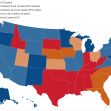A year after the Supreme Court overturned the historic Roe v. Wade decision, Arizona Governor Katie Hobbs created a unique new way to legally protect reproductive freedom in the state. Governor Hobbs signed an executive order that strengthens the ability of all residents of her state to make their own decisions, without any state interference, about their reproductive choices.
The order cleverly redirects County Attorneys in Arizona from being able to prosecute new abortion-related criminal charges and instead sends all such cases to the state attorney general. This circumvention of County Attorneys looking to prosecute pending or future abortion-related cases means that now the elected Attorney General, held by Democrat and abortion rights supporter Kris Mayes, will receive the cases.
Overall, Hobbs' executive order will centralize the state’s authority over proposed abortion prosecution cases in Arizona, thus "ensuring differences in interpretation or application of the law by different county attorneys do not chill, deter, or restrict access to lawful abortion care,” as noted in an official statement from the Governor’s office.
Governor Hobbs said, in a statement, that she was exercising her legal powers in Arizona to protect residents to make decisions about their bodies.
“I made a promise to Arizonans that I would do everything in my power to protect reproductive freedom, and this Executive Order reflects that promise,” said Governor Hobbs. “I will not allow extreme and out of touch politicians to get in the way of the fundamental right Arizonans have to make decisions about their own bodies and futures. I will continue to fight to expand access to safe and legal abortion in any way that I can.”
Prior Arizona Governor Doug Ducey signed a strict anti-abortion law in 2022 after the Supreme Court overturned Roe V. Wade in Dobbs v. Jackson Women's Health Organization. The new law made it illegal for any woman to get an abortion, even if she was raped, was the victim of pregnancy due to incest, or was pregnant with a fetus with fetal abnormalities. The stringent law was based on an Arizona anti-abortion law from 1864 that banned all abortions. The penalty for assisting a pregnant woman to obtain an abortion, in the law mandated by former Governor Ducey, was for guilty parties to serve from two to five years of jail time.
"In the year since the Dobbs decision, we have seen that anti-abortion extremists will stop at nothing in their attempts to impose their radical beliefs on the rest of the country," Attorney General Kris Mayes said. "Governor Hobbs' Executive Order provides important protections in Arizona on this issue — and it underscores our shared commitment to proactively defend the fundamental rights of individuals and ensure access to reproductive healthcare in Arizona. Together, we will continue to do what the voters of Arizona elected us to do — fight like hell to protect the rights of Arizonans to make their own private medical decisions without interference from extremist politicians and anti-choice groups.”
The governor’s executive order gives Arizona Attorney General Mayes the power to manage attempted county prosecution under the state’s current abortion laws. It also bans all state agencies from being involved in abortion criminal investigations for alleged violations in other states and also bans the extradition of people accused of violating other states' abortion laws.
Governor Hobbs launched a new Governor’s Advisory Council on Protecting Reproductive Freedom that will create and then recommend new ideas to "expand access to sexual and reproductive freedom health care in Arizona."
The new advisory council will, in part, recommend ideas to "expand access to sexual and reproductive freedom health care in Arizona.”
Under the new Arizona mandate, no state agency can share any "information, data, or investigative assistance or otherwise use any state resources" without securing a court order, to assist another anti-abortion state to prosecute or impose sanctions on anyone in a “civil or criminal anti-abortion proceeding unless it is also punishable under Arizona law.” An Arizona state agency is allowed to share information with another state only if the subject of the investigation asks for help from the state in writing.






